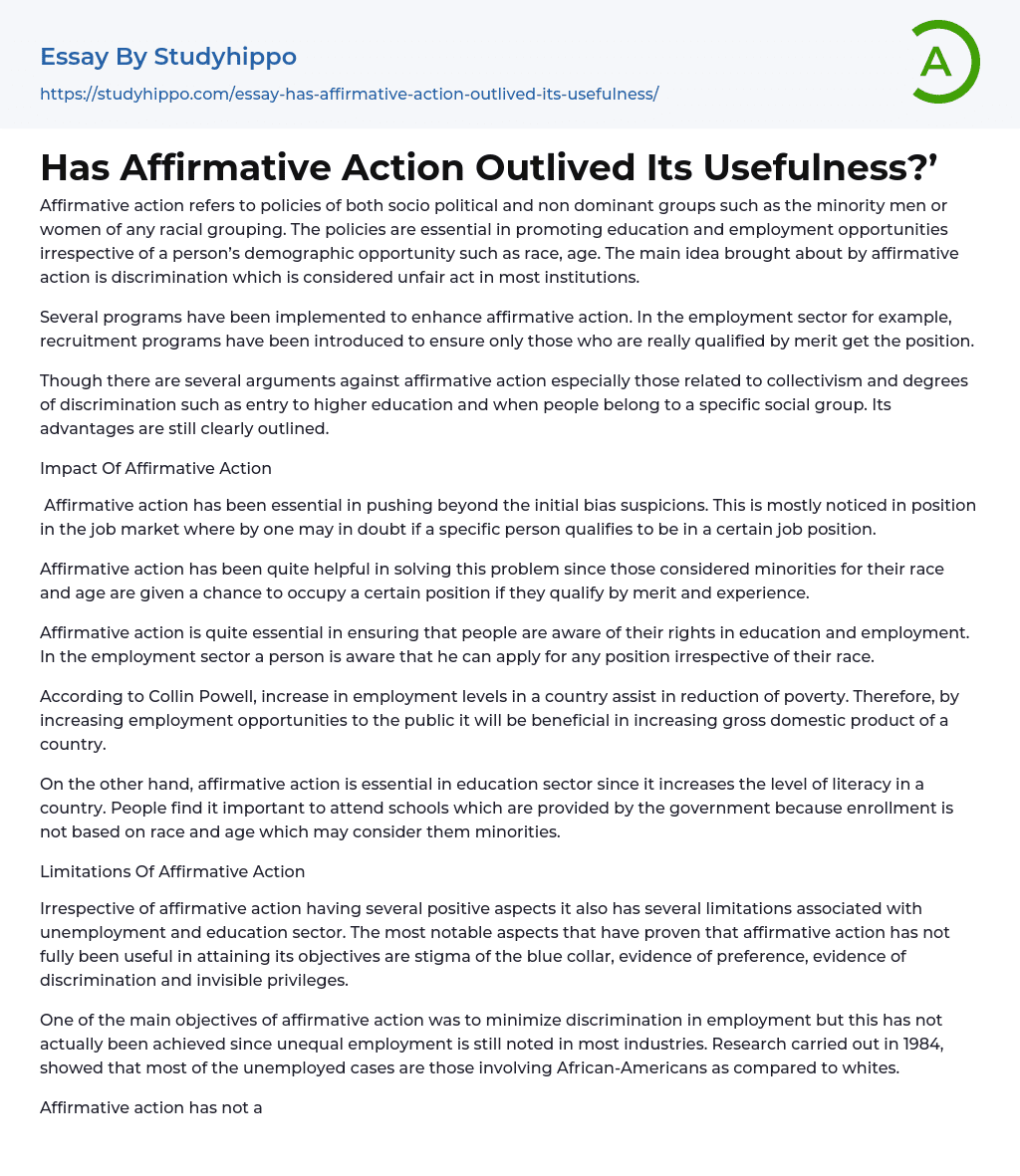

Has Affirmative Action Outlived Its Usefulness?’ Essay Example
Affirmative action aims to promote educational and employment opportunities for minority individuals, including those from various races, ages, and socio-political backgrounds. The main goal of these policies is to address unfair discrimination within institutions.
Various programs have been implemented to strengthen affirmative action, including the introduction of recruitment programs in the employment sector. This aims to ensure that only individuals who are truly qualified based on merit are selected for the position.
Despite criticisms of affirmative action, such as collectivism and discrimination in access to higher education for certain social groups, its benefits are still explicitly acknowledged.
Impact Of Affirmative Action
Affirmative action has been instrumental in mitigating initial concerns about bias, especially in job roles, by addressing reser
...vations regarding an individual's qualifications for a specific position.
Affirmative action has proven to be beneficial in addressing this issue by providing opportunities for individuals who are considered minorities based on their race and age to be eligible for certain positions if they meet the criteria of merit and experience.
Affirmative action is crucial for raising awareness about equal rights in education and employment. It ensures that individuals, regardless of their race, know that they can apply for any position within the employment sector.
According to Collin Powell, increasing employment rates helps reduce poverty and results in a higher gross domestic product for the country. Therefore, offering more job opportunities to the general public is beneficial.
The importance of affirmative action in education is that it improves literacy rates in a country. Government schools are valuable because they do not discriminate based on race
or age when enrolling students, which benefits minority groups.
Limitations Of Affirmative Action
Despite the advantages of affirmative action, there are limitations concerning unemployment and education. Challenges such as the negative perception of manual labor, proof of favoritism, bias, and unseen advantages have hindered the complete achievement of affirmative action's objectives.
Despite the main aim of affirmative action being to decrease employment discrimination, this goal remains unfulfilled as unequal employment persists in different industries. According to a 1984 study, African-Americans continue to experience higher rates of unemployment compared to whites.
Despite its intention to promote individuals' maximum potential, affirmative action has been ineffective in achieving this goal. Categorizing someone as a minority can undermine and diminish their motivation. Jane Elliot carried out an experiment involving students from various economic backgrounds.
The results analysis showed that students with a higher background displayed traits like neatness, intelligence, and open-mindedness in contrast to students with a lower background. This discovery negatively affected the confidence of minority students and hindered their ability to fully showcase their potential.
According to evidence, affirmative action has shown that blacks who are considered minorities face obstacles in obtaining senior positions such as surgeons and firefighters.
The underutilization of highly-educated minorities is evident, with a bias in task assignments. Minority employees often receive low-paying positions or projects, while white employees are rewarded with bonuses and assigned white collar responsibilities.
Furthermore, affirmative action is perceived as ineffective due to the recognition of concealed benefits. In the employment sector, individuals who believe they are superior to others, particularly if hiring decisions were influenced by social and economic
status, often disregard the established protocols and guidelines within the organization.
An employee might not be bothered by arriving late to a meeting as it could be perceived as a result of their race, or they may choose to avoid interacting with colleagues whom they have been taught to distrust.
Despite addressing concerns about minority discrimination, preference, and class divisions, affirmative action does not fully resolve the following inquiries.
- Who exactly are minorities?
- Which sectors can affirmative action are excluded?
- How are career plans created?
Reference
- Hurst, C. Social Inequality Forms, Causes, and Consequences. Sixth Edition. 2007. 374-377.
- Belbin. M. (1981). Management Teams. London; Heinemann
- Hardin, Russell (1982). Collective Action John Hopkins University Press Baltimore. ISBN 0-8018-2818-8
- Affirmative Action essays
- Assisted Suicide essays
- Capital Punishment essays
- Censorship essays
- Child Labour essays
- Child Protection essays
- Civil Rights essays
- Corporal Punishment essays
- Death Penalty essays
- Empowerment essays
- Euthanasia essays
- Gay Marriage essays
- Gun Control essays
- Human Trafficking essays
- Police Brutality essays
- Privacy essays
- Sex Trafficking essays
- Speech essays
- American Dream essays
- Barriers To Entry essays
- Capitalism essays
- Central Bank essays
- Compensation essays
- Consumerism essays
- Economic Development essays
- Economic Growth essays
- Economic Inequality essays
- Economic System essays
- Economy essays
- Employment essays
- Export essays
- Finance essays
- Free Trade essays
- Gross Domestic Product essays
- Human Development essays
- Income Inequality essays
- Industry essays
- Inflation essays
- International Business essays
- International Trade essays
- Macroeconomics essays
- Materialism essays
- Max Weber essays
- Microeconomics essays
- Minimum Wage essays
- Monetary Policy essays
- Monopoly essays
- Pricing essays
- Profit essays
- Recession essays



